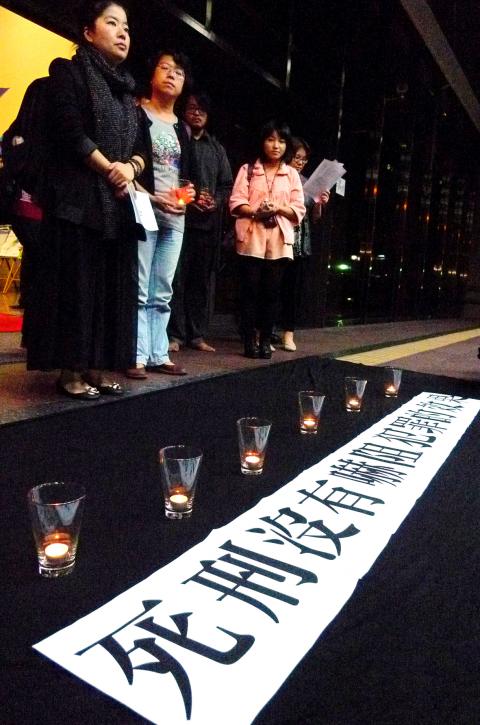Campaigners against the death penalty from both Taiwan and the UK yesterday accused the government of failing to fulfill its obligations under the International Covenant on Civil and Political Rights (ICCPR) concerning executions by abolishing the death penalty.
“In 2009, the international community welcomed Taiwan’s decision to ratify the two international human rights covenants and to make them domestic laws. We believed that it would lead to the ultimate abolition of the death penalty,” UK Representative to Taiwan Chris Wood said during a press event to release the first report on the death penalty in Taiwan published by the UK-based nonprofit advocacy group the Death Penalty Project in Taipei. “Sadly, in the years since then, there have been multiple executions.”
While stressing that it is the government and the people of Taiwan that should make the final decision on capital punishment, Wood said that the British government had expressed its disappointment following executions carried out in April.

Photo: CNA
“The death penalty undermines human dignity and there is no conclusive evidence that it deters crimes,” Wood said, adding that two-thirds of countries have abolished capital punishment.
While saying that signing the ICCPR does not mean that a country should immediately abolish capital punishment, Death Penalty Project executive director Saul Lehfreund said that signatory nations — including Taiwan — have consented to make it the ultimate objective and to follow the most strict standards before executions.
“The covenant provides the right to request a pardon and clemency [for death-row inmates], no person may be executed while an application for clemency or a pardon is in process,” Lehfreund said. “Unless Taiwan can fulfill its human rights obligations, it should not carry out executions.”
While many people against the abolition of the death penalty argue that it is part of the culture and that Taiwan should not abolish capital punishment due to pressure from foreign and domestic human rights groups, Lehfreund said that “retaining the death penalty does not involve sovereignty, culture or tradition.”
Elaborating on Lehfreund’s views, Chang Wen-chen (張文貞), an associate professor at National Taiwan University’s Law School, and a coauthor of the report, said that the government has clearly not met the minimum requirements when carrying out executions.
“According to the law, the president is the only person who has the power to grant an amnesty, but other government agencies — including the Council of Grand Justices, the Control Yuan and the Legislative Yuan — also have the power and the obligation to better protect the rights of death-row inmates,” Chang said. “For instance, currently the president is not required to reply to a death-row inmate’s application for pardon. So we’ve cases in which inmates don’t know what’s going on after filing an application for pardon or an appeal, and were informed that they would be executed the next day, without knowing whether the application process had ended.”
In such cases, the legislature may intervene by amending the law to require that the Presidential Office or the judiciary should clearly inform inmates about the handling of their applications for a pardon or an appeal, Chang said.
Democratic Progressive Party Legislator Yu Mei-nu (尤美女) also said that while the ICCPR states that a person suffering from a mental disorder should not be executed, “we have no law requiring mandatory assessment of an inmate’s mental condition — this is something we should do immediately.”

‘DENIAL DEFENSE’: The US would increase its military presence with uncrewed ships, and submarines, while boosting defense in the Indo-Pacific, a Pete Hegseth memo said The US is reorienting its military strategy to focus primarily on deterring a potential Chinese invasion of Taiwan, a memo signed by US Secretary of Defense Pete Hegseth showed. The memo also called on Taiwan to increase its defense spending. The document, known as the “Interim National Defense Strategic Guidance,” was distributed this month and detailed the national defense plans of US President Donald Trump’s administration, an article in the Washington Post said on Saturday. It outlines how the US can prepare for a potential war with China and defend itself from threats in the “near abroad,” including Greenland and the Panama

A wild live dugong was found in Taiwan for the first time in 88 years, after it was accidentally caught by a fisher’s net on Tuesday in Yilan County’s Fenniaolin (粉鳥林). This is the first sighting of the species in Taiwan since 1937, having already been considered “extinct” in the country and considered as “vulnerable” by the International Union for Conservation of Nature. A fisher surnamed Chen (陳) went to Fenniaolin to collect the fish in his netting, but instead caught a 3m long, 500kg dugong. The fisher released the animal back into the wild, not realizing it was an endangered species at

The Chinese Nationalist Party (KMT) is maintaining close ties with Beijing, the Democratic Progressive Party (DPP) said yesterday, hours after a new round of Chinese military drills in the Taiwan Strait began. Political parties in a democracy have a responsibility to be loyal to the nation and defend its sovereignty, DPP spokesman Justin Wu (吳崢) told a news conference in Taipei. His comments came hours after Beijing announced via Chinese state media that the Chinese People’s Liberation Army’s Eastern Theater Command was holding large-scale drills simulating a multi-pronged attack on Taiwan. Contrary to the KMT’s claims that it is staunchly anti-communist, KMT Deputy

The High Prosecutors’ Office yesterday withdrew an appeal against the acquittal of a former bank manager 22 years after his death, marking Taiwan’s first instance of prosecutors rendering posthumous justice to a wrongfully convicted defendant. Chu Ching-en (諸慶恩) — formerly a manager at the Taipei branch of BNP Paribas — was in 1999 accused by Weng Mao-chung (翁茂鍾), then-president of Chia Her Industrial Co, of forging a request for a fixed deposit of US$10 million by I-Hwa Industrial Co, a subsidiary of Chia Her, which was used as collateral. Chu was ruled not guilty in the first trial, but was found guilty